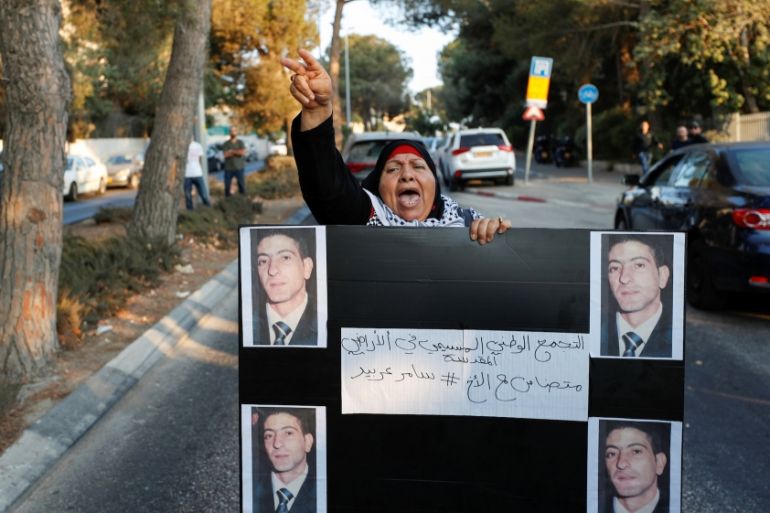Palestinians have a right to demand freedom from torture
As Israel continues to torture prisoners with impunity, Palestinian calls for humane treatment fall on deaf ears.

Samer Arbeed, a 44-year-old Palestinian man, was violently arrested on September 25 by plain-clothed Israeli soldiers on suspicion of organising a deadly bombing in the occupied West Bank. After initially being beaten, he was taken to the infamous Maskobiyeh Interrogation centre in Jerusalem, where he endured torture so severe he had to be hospitalised.
Arbeed remains in a critical condition and has been denied proper access to medical care and his lawyers. The Israeli media reported that a judicial body had authorised the Israeli Secret Service, Shin Bet, to use “exceptional methods” to extract information for this case, leading Amnesty International to condemn what happened to Arbeed as “legally-sanctioned torture“.
Meanwhile, another prisoner, 24-year-old Palestinian woman Heba al-Labadi, has been on a hunger strike for well over two weeks after being sentenced to administrative detention for five months and being subjected to physical torture, including excruciating stress positions. Such stress positions can involve shackling the hands to the ankles, forcing the prisoner to lean forward, for lengthy periods of time.
Arbeed and al-Labadi’s situations are unfortunately not exceptional and Israeli interrogators frequently use torture on Palestinian political prisoners of which there are approximately 5,000.
The prohibition of torture is clearly enshrined in customary international law and the United Nations Convention Against Torture (which was ratified by Israel in 1991) reiterates this. The convention defines torture as an “act by which severe pain or suffering, whether physical or mental, is intentionally inflicted on a person for such purposes as obtaining from him or a third person information or a confession”.
Israel is thus bound by the international legal regime to not commit acts of torture against anyone including Palestinians. Yet, Palestinian Prisoner Support and Human Rights organisation, Addameer, has documented extensively that Israel has for decades violated this convention. “Israel’s ill-treatment and abuse of Palestinian detainees is widespread and systematic and typically starts from the moment of arrest,” it has said.
Israel’s torture of Palestinians is made particularly easy by its occupying military regime which is ruling over the West Bank. This regime allows Palestinians to be interrogated for 90 days without a lawyer. This initial period of interrogation can then be indefinitely renewed. During interrogation, Palestinian prisoners are routinely subject to various forms of mental and physical torture including beatings, stress positions, sleep deprivation and solitary confinement. Their lack of communication with the outside world often allows for this treatment to continue unchecked. Since the establishment of this military regime over the West bank in 1967, the Palestinian Prisoner’s Club (an NGO) has reported the deaths of 73 detainees as a result of torture.
Following the news of the arrest and torture of Arbeed, Palestinians in Ramallah and Jerusalem protested against not only his inhumane treatment at the hands of the Israelis but also the failure of the International Committee of the Red Cross (ICRC) to uphold its mandate to protect detainees and prisoners from harm. A few days after Arbeed was transferred to a hospital in critical condition, activists conducted a peaceful sit-in at the offices of ICRC in Ramallah, demanding they put pressure on Israel to allow for a proper medical visit to assess his condition. Prisoners’ family and friends have long been active in sit-ins and protests at the ICRC offices as such protests are their only tool in the face of a complete lack of accountability for the violations conducted by the Israeli regime. Eventually, an ICRC doctor was able to visit Arbeed in hospital and share medical information with the family as per the request of the activists.
The ICRC subsequently released a statement, not in condemnation of Israel’s treatment of Arbeed as one might expect, but rather in condemnation of activists whom they accused of “insulting” their staff by questioning their commitment to Palestinian detainees. This misplaced condemnation completely ignores the fact that Palestinians are entirely entitled to question whether an international organisation is fulfilling its mandate. Particularly, as their daily conditions continue to worsen and the international aid and humanitarian business continues to thrive. The demand for humane treatment and freedom from torture is a bare minimum ask and thus calls and actions for such must be respected.
The views expressed in this article are the author’s own and do not necessarily reflect Al Jazeera’s editorial stance.
